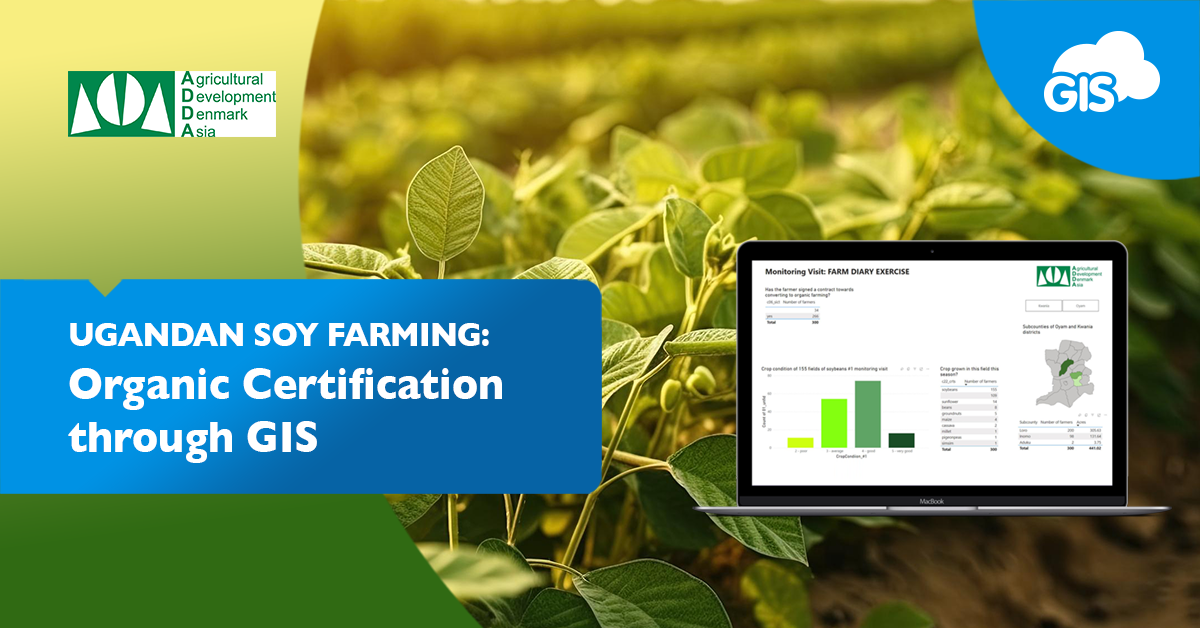
ADDA, Agricultural Development Denmark Asia, and partners have enabled 300 smallholder farmers in Northern Uganda to obtain an EU Organic Certification through digitization with GIS Cloud.
Soybeans have gone from being an alternative crop to a global market mover. This shift in agriculture has given small Ugandan farmers a stage on the world market with a high-demand product. Working with ADDA and using GIS Cloud, these small farmers have made their products more valuable, improving their livelihoods and communities.
We will walk you through the steps to get certified and how GIS Cloud’s tools support the entire process.
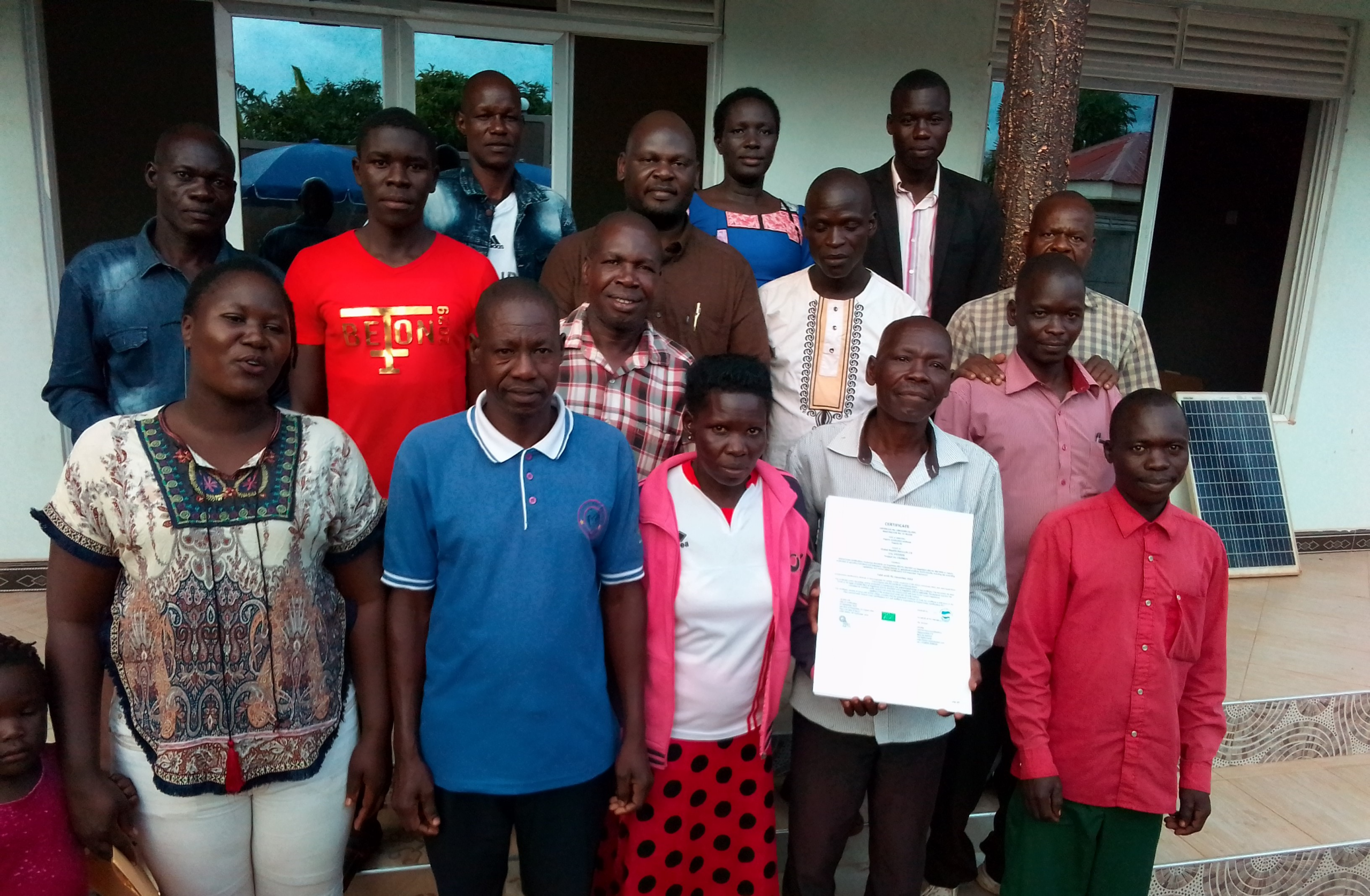
A group of Ugandan small-scale farmers received their EU Organic Certificate.
The Importance of Certified Organic Soybeans
During the past few decades, global production of soybeans has increased dramatically from approximately 220 million tons in 2008 to 333 million tons in 2018. During the same period, soybeans became one of the leading agricultural commodities traded globally.
According to industry experts, soybeans have an 184 billion dollar global market. It is expected to reach $250 billion by the decade’s end.
Earning an EU Organic Certification makes the soybeans produced in Northern Uganda competitive on the global market and promotes the sustainability of the farmers.
Soybeans are used in food, fuel, and feed products. They have grown in popularity as a product and crop since the nitrogen-fixing soybeans return nitrogen from the air to the soil. This makes them an ideal rotation crop with corn. Common soybean food products include tofu, soy milk, and soybean oil. Soybeans have a high concentration of protein while being low in fat and cholesterol. Soybeans are used to produce biodiesel as a fuel. As a drop-in fuel, soybean-based biodiesel can be used in machinery without swapping parts or converting fuel systems. Because of their high protein content, soybeans have become a staple in the diets of farm-raised fish, poultry, pigs, and cows. About 85% of all soybeans produced are used for animal feed.
But as worldwide populations shift to more plant-based diets, the demand for soybeans for producing plant-based meat, milk, tofu, and cheese is growing globally. This increase in demand is putting pressure on producers to grow organic and use sustainable methods in their farming.
Data on import volumes of organic products of the European Union (EU) show a consistent increase in imports of organic soybeans from overseas countries in many of which smallholder agricultural production is predominant:
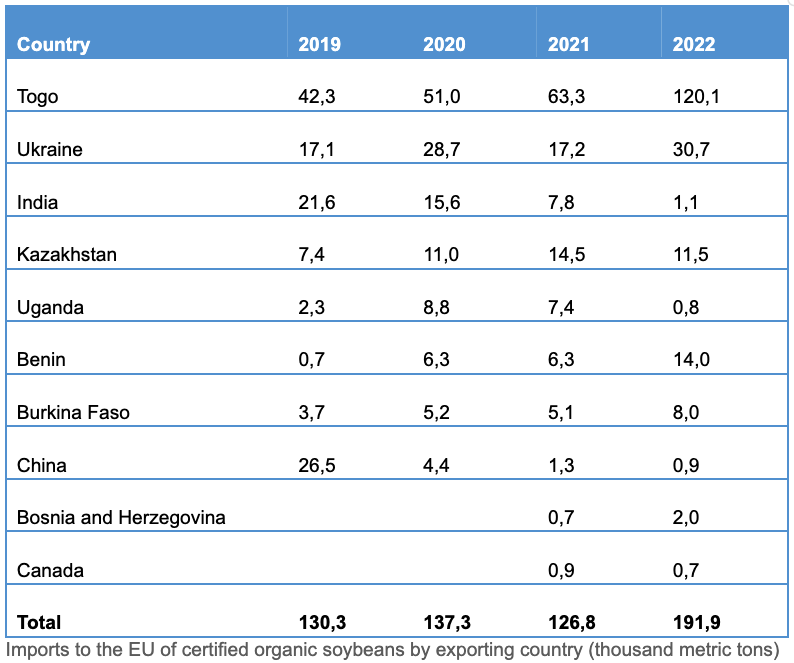
While significant, the total annual imports to the EU of 191.9 thousand metric tons of certified organic soybeans in 2022 is a drop in the bucket compared to the total annual imports of conventional soybeans to the EU, an approximate 30 million metric tons. This clearly underscores that certified organic soybeans from smallholder farmers are still a tiny but significant and increasing fraction of the total soybean imports to the EU.
Additionally, the price premium paid for sustainably grown organic soybeans over conventional soybeans makes organic soybeans an ideal crop for smallholder farmers across the Global South.
EU Organic Certification Challenges
Earning an EU Organic Certification is challenging enough. For a smallholder Ugandan farmer, it’s a monumental challenge. Before the involvement of ADDA and partners, obtaining an EU Organic Certification was beyond the reach of the Ugandan smallholder farmers.
A prerequisite to obtaining an EU Organic Certification is that the local organization representing the farmers establishes an Internal Control System (ICS) to oversee and enforce the organic farming practices in the area. This ICS had to be established from scratch.
ADDA’s partner, the Danish Ugandan Friendship Association (DUFA), worked closely with the local NGO, Global Health Network Uganda (GHNU), to establish a local Internal Control System (ICS). This ICS would document the organic food production process. This included training the smallholder farmers in organic farming practices and training the staff of GHNU in overseeing the implementation of these practices.
The EU’s goals for organic farming include:
- Maintaining the area’s biodiversity
- Preserving ecological balance
- Enhancing soil nutrients
- Maintaining water quality.
Quantifying and providing evidence of meeting these requirements using a paper-based solution would certainly be feasible with a very limited number of farmers. But as you scale up to hundreds of farmers, you need a fully digitalized system, which makes it possible to cross-verify the authenticity of the data with confidence and accuracy (Geo-tag and exact time of each monitoring visit).
GIS Cloud’s Introduction to Uganda
The introduction of GIS Cloud to the local partner GHNU in Uganda was very straightforward.
At the outset of the project, a few online sessions were held with project staff to agree upon the questionnaires to be deployed to comply with the monitoring requirements of the ICS (Internal Control System) required by the EU Organic Regulations.
The next step was to train the local staff using the GIS Cloud Mobile Data Collection App (MDC). After a few hours, the team felt confident using the MDC application.
The first data collection loop focused on collecting the polygons of the smallholder farmers’ fields and registering each farmer’s biometric data. The following data collection loops focused on monitoring the farmers’ organic farming practices and crop development in the field.
In collaboration with the Danish Ugandan Friendship Association (DUFA) and the local NGO, Global Health Network Uganda (GHNU), ADDA leveraged the entire GIS Cloud toolbox from concept to certification.
The team began the project in 2020 with the following goals:
- Organize the 300 smallholder farmers in groups
- Establish an Internal Control System (ICS) for documenting the organic farming methods with the local NGO, GNHU
- Digitally document the organic farming practices of the farmers
- Getting the farmers an Organic Certification from the EU
ADDA has been using the GIS Cloud platform of tools since 2019. They had previously tested the different GIS Cloud products on farming projects in Tanzania.
Field data collection
To obtain the EU Organic Certification, ADDA needed to capture data on organic farming practices and present it to the Accredited Certification Agency, Control Union.
ADDA used locally available low-cost Android smartphones (TECNO) for field data collection.
Equipped with these low-cost smartphones and the Mobile Data Collection App (MDC), local farm advisors succeeded in mapping the 300 farms with precision and accuracy in a few weeks. The data collected (qualitative and quantitative data and photos) could be visualized and shared in real-time with project management in engaging 3D maps in the GIS Cloud.
All the farmers then received repeated follow-up visits by the farm advisors throughout the agricultural season, which were similarly registered in the MDC App.
Each inspection record was timestamped and geo-tagged, providing auditors with data validation. The records also captured photos of the overall field, the planted rows, and close-ups of the soybean plants.
This was invaluable as it was evidence of where, how, and when the organic farming practices were conducted.
In real-time, the data was being reflected in GIS Cloud and presented on the desktop in a 3D environment on Map Viewer.
In Map Editor, the team was able to filter and analyze the data. They were able to inspect the records by farm, data, region, and plant age.
This analysis was then exported as custom reports.
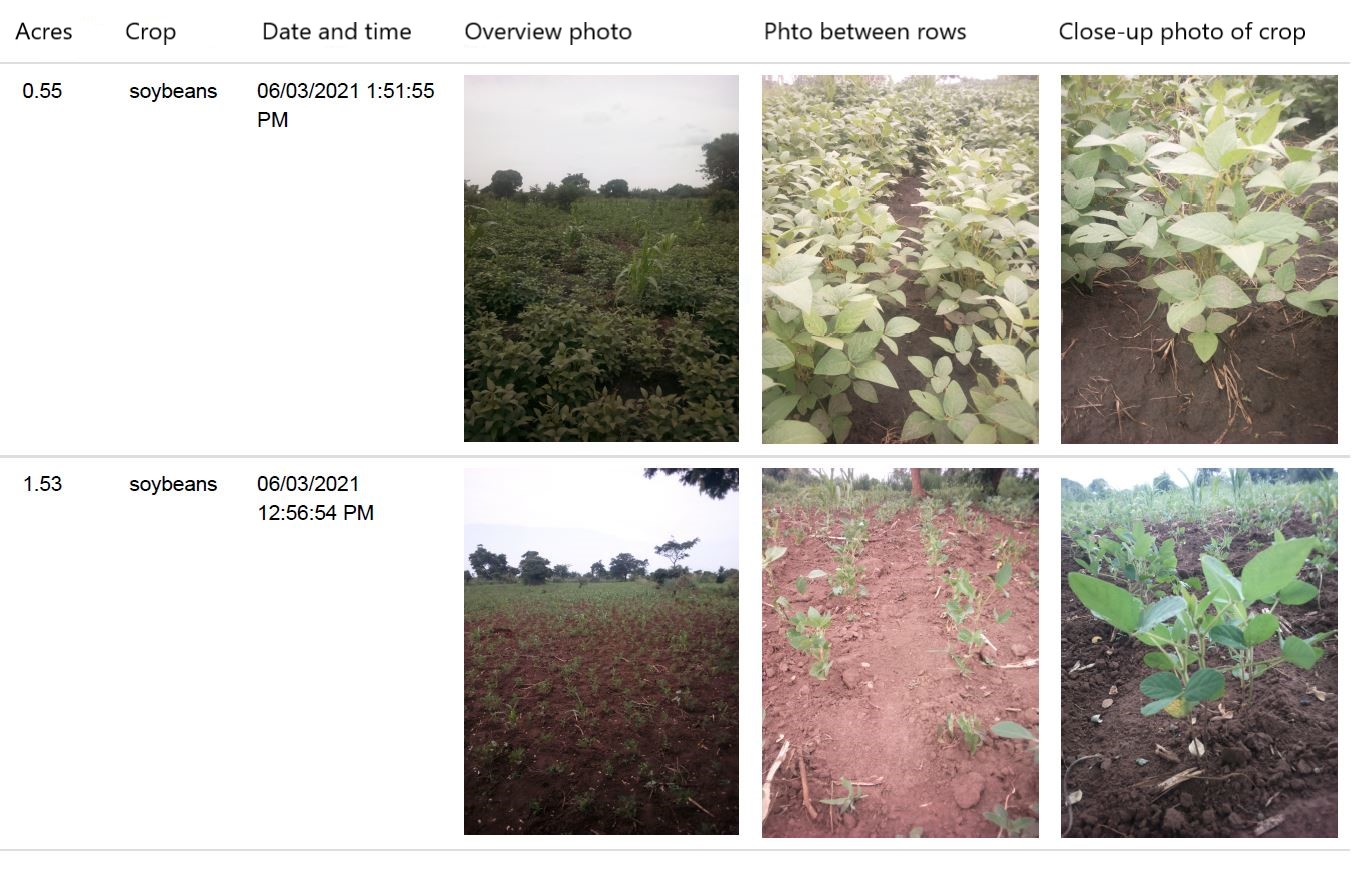
With the data available for download from GIS Cloud as a CSV, the ADDA team used a direct integration into Microsoft Power BI dashboards. The dashboards presented interactive tables, graphs, and maps to project partners.
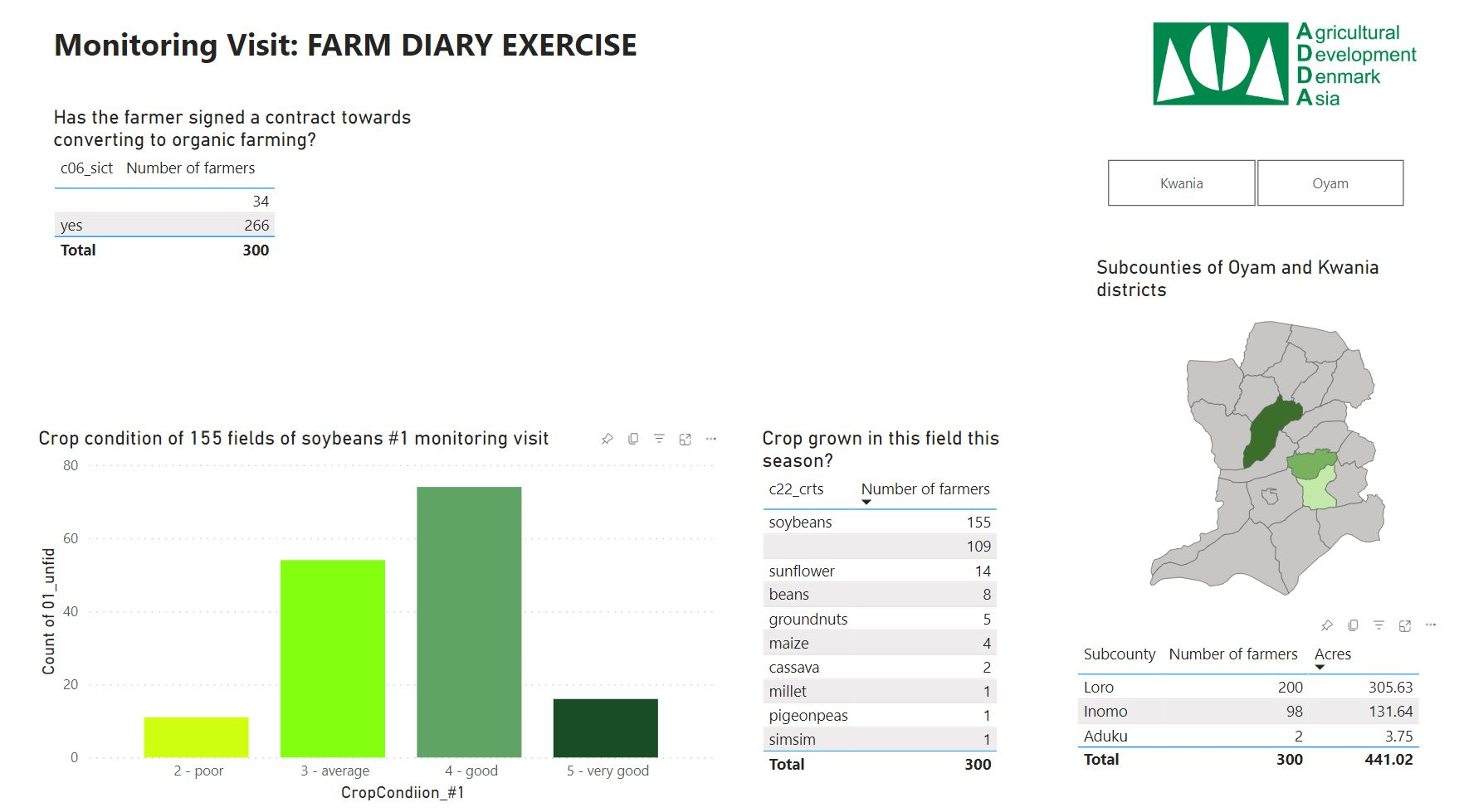
The interactive GIS Cloud 3D maps and field monitoring data constituted the backbone of the Internal Control System (ICS) during the Accredited Certification Agency, Control Union’s annual control visit in July 2021.
In September 2021, the EU Organic Certificate was issued by the Control Union.
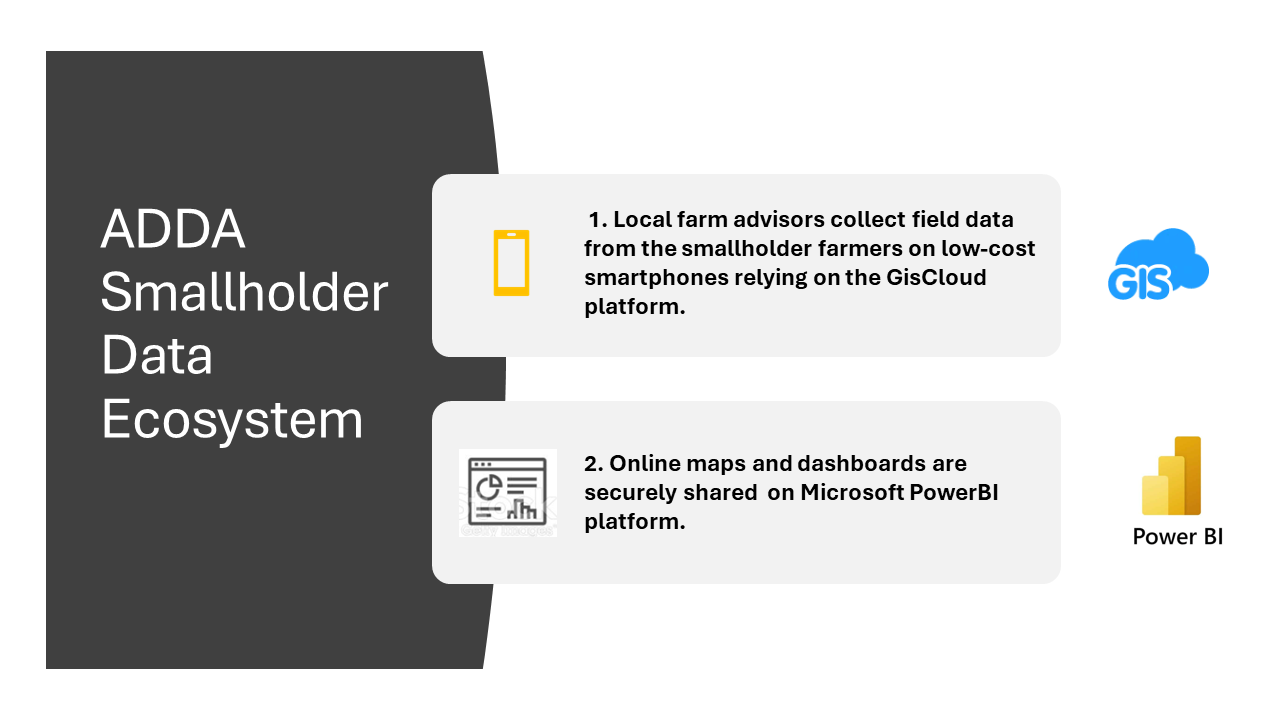
Future Implications and Scalability
ADDA plans to continue using its GIS Cloud workflow for Uganda’s farming efforts. This documented and proven method of achieving and maintaining organic certification will continue to empower the local Ugandan farmers.
ADDA is a global organization, as is GIS Cloud. The two organizations plan to support future projects throughout Africa and Asia. GIS Cloud’s success in functioning well on low-cost smartphones will prove to be a critical feature.
Prior projects completed by the ADDA connected 4,000 Tanzanian farmers to international markets for organic produce. Using the same workflow, they can adjust the scale of their project scopes using GIS Cloud.
Conclusion
GIS Cloud proved to be the perfect solution for ADDA and Ugandan farmers. Maintaining their EU Organic Certification will be routine, keeping them competitive in the global soybean market.
ADDA was successful in the implementation of GIS Cloud and its digital process. Next, they are deploying GIS Cloud to document compliance under the newly approved EU Deforestation-Free Regulation (EUDR). This is a new mandatory requirement that all EU-based companies trading in 7 major commodities (soy, cattle, palm oil, wood, cocoa, coffee, and rubber) have to comply with. This regulation aims to reduce deforestation caused by commodities delivered to the EU.
Operators and traders will have to prove that the products are both deforestation-free (produced on land that was not subject to deforestation after 31 December 2020) and legal (compliant with all relevant applicable laws in force in the country of production). Companies will also be required to collect precise geographical information on the farmland where the commodities they source have been grown to be checked for compliance.
If you want to digitize your farming operation, sign up for our 14 day free trial and test out all our premium products risk-free. Our Solution Consultants would happily provide their expertise if you have any questions.
Feel free to contact ADDA directly to learn more about their digital journey and successful deployment of GIS Cloud to the benefit of smallholder farmers across Africa and Asia:
Mikael Jonsson
Vice-Chairman, ADDA
Agricultural Development Denmark Asia
Mobile +45 2835 4235
mijo@adda.dk
www.adda.dk







